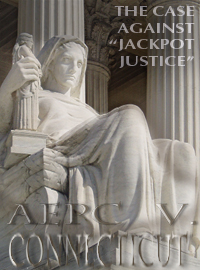| Only a Partial Win at Supreme Court Against Globaloney Environmental Lawsuit |
 |
|
By Quin Hillyer
Wednesday, June 22 2011 |
The Constitution and the concept of judicial restraint each won one huge victory on Monday in an environmental lawsuit out of Connecticut, but only by confirming an earlier encroachment on both the Constitution and right reason. That earlier encroachment still bedevils both constitutional law and public policy. The case decided Monday, American Electric Power Company v. Connecticut, involved a suit filed by eight states and several land trusts against five power companies, alleging under “public nuisance” theory that the companies’ air emissions contribute to global warming and thus interfere with public rights by risking human health, rising sea levels and other ills alleged by global warming cultists. Connecticut’s suit is one of three lawsuits (others emanate from Mississippi and Alaska) wending their way through the federal courts that could open the door for literally thousands of “jackpot justice” environmental claims. These suits threaten not only to hobble the power companies but to add tremendous regulatory costs resulting in major hikes in consumer energy prices. Worse, they threaten to upend the legal tradition that makes a defendant liable only for specific harms clearly caused by the defendant’s actions or products. The suits also ask the judiciary to fulfill a policy-making role wholly beyond the traditional, proper – in other words, limited – authority given to judges to merely interpret existing law rather than legislate from the bench. Connecticut explicitly asks courts to set emissions standards, displacing the functions usually borne by Congress and/or executive outlets such as the Environmental Protection Agency. Fortunately, eight justices (Justice Sotomayor recused herself) unanimously agreed that this assumption of judicial authority “cannot be reconciled” with the constitutional order. “Federal judges lack the scientific, economic, and technological resources an agency can utilize in coping with issues of this order,” wrote Justice Ruth Bader Ginsburg for a unanimous court. The decision is thus a blow to the plaintiffs’ bar, stopping lawyers from this particular avenue of concocting billion-dollar cases out of thin air at the expense of consumers, company stockholders including pensioners and what Ginsburg called any “other defendants fitting the description [of] ‘large contributors’ to carbon-dioxide emissions.” The bad news, however, is that the high court’s reasoning not only leaves in place, but reinforces, a horrible 2007 decision that enthroned global warming blarney as the law of the land. In Massachusetts v. EPA, the court substituted its own judgment for that of the experts at EPA by ordering the reluctant agency to “regulate greenhouse gases” under terms favorable to interpretations advanced by global-warming believers. The EPA under President G.W. Bush had ruled “a causal link” between greenhouse gases and global warming “cannot be unequivocally established” – but the court, in its arrogant unwisdom, insisted that “the harms associated with climate change are serious and well recognized” and that greenhouse gas emissions “contribute to climate change.” Having thus ordered the agency to reconsider, the court now relies on the agency’s reconsideration, and subsequent regulation of greenhouse gases, to tell Connecticut that only the EPA can set emissions standards. The states, and eventually the plaintiffs’ lawyers, may not ask judges to do what the EPA has the authority to do – but only now that the EPA is exercising such authority the way the Supreme Court wishes. The court should have jettisoned Connecticut’s lawsuit on the perfectly reasonable grounds that the link between alleged injuries and any action by the utilities is too tenuous for a court to recognize. Instead, it relied on Massachusetts v. EPA to put the power in the hands of the Obama EPA rather than the hands of lower court judges. As Justices Alito and Thomas drily noted in a very short concurring opinion, the justices effectively are forced into “the assumption” that the 2007 Massachusetts case was correctly decided only “because no party [in the Connecticut case] contends otherwise.” It is true that if the EPA must regulate greenhouse gas emissions, then state courts applying tort law should not substitute their judgments for that of the EPA. The problem is, the Obama EPA and the Supreme Court in the Massachusetts case both have based their judgments on data from the Intergovernmental Panel on Climate Change, the United Nations body rocked by scandal for manipulating data, suppressing inconvenient information and failing to welcome scientific peer reviews. Rather than having the EPA or judges regulate carbon dioxide, nobody should regulate carbon dioxide. In short, this is bad tort law theory being overturned not because it is bad tort law, but because of reliance on bad science and bad earlier judging. Those latter two wrongs have led to a right result, but for the wrong reasons. The American people are safer from judicial overreach as a result of Monday’s decision. But until Massachusetts v. EPA is overturned, those who value limited government will still be choked by regulatory smog. |
Related Articles : |
























